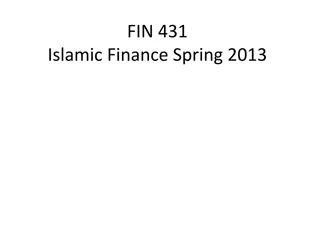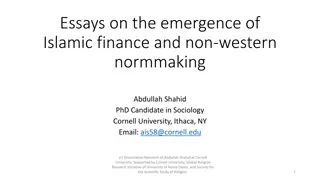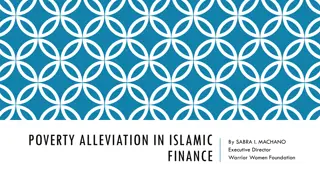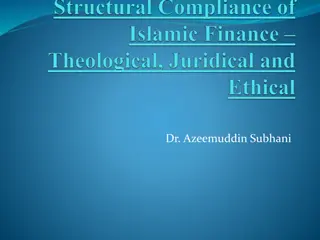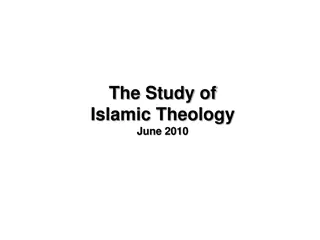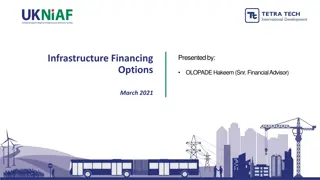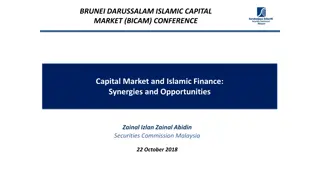Understanding Ijarah in Islamic Finance: Principles and Applications
Explore the concept of Ijarah in Islamic Finance, which denotes leasing and rental arrangements based on Shariah principles. Discover the types, characteristics, and processes of Ijarah, along with rules governing this Islamic finance concept.
Download Presentation

Please find below an Image/Link to download the presentation.
The content on the website is provided AS IS for your information and personal use only. It may not be sold, licensed, or shared on other websites without obtaining consent from the author. Download presentation by click this link. If you encounter any issues during the download, it is possible that the publisher has removed the file from their server.
E N D
Presentation Transcript
Center of Islamic Finance COMSATS Institute of Information Technology Lahore Campus Adopted from open source lecture of Meezan Bank. 1
Ijarah is a term of Islamic Fiqh Literally, it means To give something on rent The term Ijarah is used in two situations: 1. It means To employ the services of a person on wages e.g. A hires a porter at the airport to carry his luggage 2. Another type of Ijarah relates to paying rent for use of an asset or property defined as LAND in Islamic Economics. 3
Ijarah is an Islamic alternative of Leasing. Leasing backed by an acceptable contract is an acceptable transaction under Shariah. The question of whether or not the transaction of leasing is Shariah compliant depends on the terms and conditions of the contract. Several characteristics of conventional agreements may not conform to Shariah thus making the transaction un-Islamic and thereby invoking a prohibition. 4
Risk and rewards of ownership lies with the owner i.e. any loss to the asset beyond the control of the lessee should be borne by the Lessor. Late payment penalty cannot be charged to the income of the Lessor. Lease and Sale agreement should be separate and non contingent. 5
Transferof Title . . VENDOR CUSTOMER ISLAMIC BANK Agreement-1 Payment of Purchase Price The customer approaches the Bank with the request for financing and enters into a promise to lease agreement. The Bank purchases the item required for leasing and receives title of ownership from the vendor. The Bank makes payment to the vendor. 7
Transferof Title Transferof Title . . VENDOR CUSTOMER ISLAMIC BANK Agreement-2 Payment of Purchase Price Payment of Rental Fees The Bank leases the asset to the customer after execution of lease agreement. The customer makes periodic rental payments as per the contract. At the end of the tenure customer can purchase the asset from the bank with the help of separate Sale agreement. 8
Rules governing Ijarah are similar to the rules governing sale. Because in both cases something is transferred from one person to another The only difference is: In case of sale, title of property is transferred to Buyer. In case of Ijarah, title remain with the Lessor. Only the use of the property is transferred to Lessee. 10
Leasing is a contract where the owner of an asset 1. transfers its use to another person against an agreed price. However, ownership of the leased asset remains with 2. the Lessor 11
Since ownership of the leased asset remains with the 3. Lessor, all rights and liabilities relating to ownership are borne by the Lessor. All rights and liabilities relating to use are borne by the Lessee e.g. A gives his house to B on rent. Property taxes are to be borne by the owner. Water tax, electricity bill etc are to be borne by the Lessee. 12
Subject matter of Lease should be Valuable, Identified 4. and Quantified. The period of Lease must be determined in clear terms. 5. The Lessee is responsible for damage to the asset 6. caused by fraud or negligence. Any damage to the asset not caused by the Lessee s 7. neglect, is to be borne by the Lessor. 13
8. Normal maintenance is Lessees responsibility. 9. Lease rentals for the entire lease period must be fixed at the time of Lease Agreement; a) Different amounts of rents can be fixed for different periods, but they must be known. b) The rent may be tied to a known benchmark, acceptable to both the parties. 14
10. The Lessor cannot increase the rent unilaterally 11. The Lessor may receive the rent in advance, but such payment should be recorded as an Advance rental. Balance Sheet should reflect this payment as Liability, since rent can be received only for use of an asset. 15
12. The Lease period will start when the asset has been delivered to the Lessee - in a usable condition - whether or not the Lessee has started using it 13. If the leased asset is destroyed, the lease will terminate. 14. If the Lessee is at fault, he is liable to compensate the Lessor for the loss. 16
If the Lessee contravenes any term of the Lease agreement the Lessor may unilaterally terminate the agreement. If there is no contravention, the agreement can only be terminated by mutual consent. Conventional Financial Lease agreements give termination right to Lessor in all cases. This is contrary to Shariah laws. 17
Difference b/w Conventional Lease & Ijarah 1. In conventional lease the Lessor has the unilateral right to rescind the lease contract at his sole discretion, which is against the laws of Shariah, 2. Expenses under Ijarah are as follows: Lessor- expenses relating to the corpus of the asset i.e. insurance, accidental repairs etc. will be borne by the lessor Lessee- actual operating/overhead expenses related to running the asset will be borne by the lessee 18
Difference b/w Conventional Lease & Ijarah 3. Two contracts into one contract is not permissible in Shariah therefore, we cannot have the agreement of hire and purchase into one agreement, only we can undertake/promise to purchase the leased asset. 4. In conventional lease the lease starts even before the existence of assets, which is also not permissible in Shariah. 5. Penalty income is charged for late payments in Conventional lease. 19
THANK YOU 20




